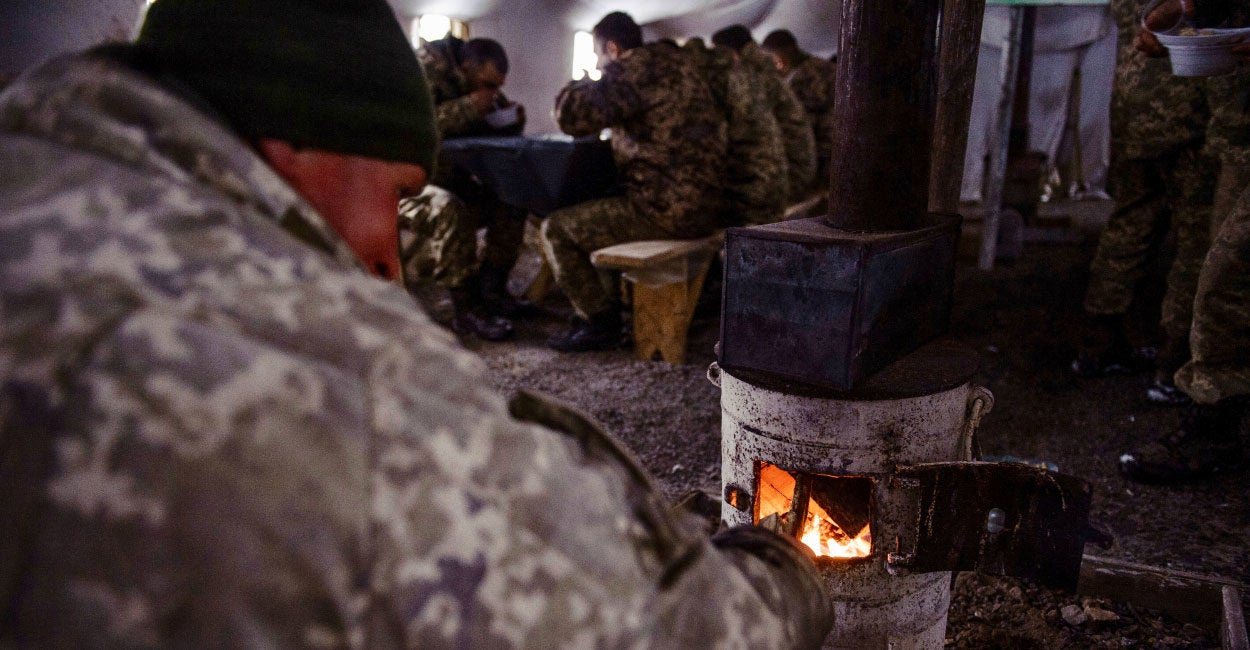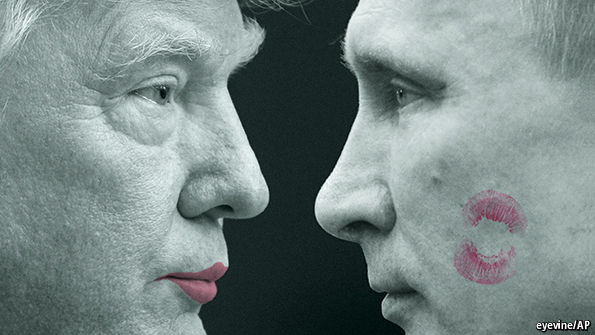Mourning the USSR, Stalking Ukraine
"Certainly this is still a war, Minsk doesn’t work."
"It’s a real war. It’s hard. Every day, the mortars and the shellings. It’s static warfare. We want to attack, but there are lots of reasons we cannot."
"People are tired, both civilians and military. But we have to fight for our land and the possibility to survive as a nation. If we give up here, we give up our independence."
"We have to be independent from Russia."
"We can tell if it’s separatists, or Russian soldiers. They fight in different ways. The separatists are unorganized, they move like bugs in different directions. But Russian units move in a coordinated, disciplined way. And Russian artillery is much more accurate."
"If we give up, we will be betraying our fallen comrades. It will all be in vain. A lot of sons of Ukraine died fighting for this."
"Our reserves must be prepared for everything. It’s a high risk, but what else can we do? I know many guys who have fought to the death."
"Every soldier stands here for a better future. Not for himself, but for his children and his grandchildren. We have to free this land for our future generations. We’re sick and tired of living under Russian influence."
Ivan Burdiuh, 31, press officer, 30th Brigade, Volnovakha, Ukraine
"We now see a new, strong, professional Ukrainian army."
"But we’re still creating things from scratch. Certainly, our battlefield medicine has serious deficiencies."
When you have a war fought from fixed positions for so long, typically the morale of the soldiers starts to fall. But most of these guys are young, about 20 to 22 years old. They deal with the difficulties. Their eyes are still warm. They’re young, but they have a real desire for victory. It’s hard to understand this from far away."
Oleg Zinevych, 45, civilian volunteer medic, 30th Brigade
 |
| Ukrainian soldiers keep warm during a meal in Volnovakha. (Photo: Olga Ivashchenko) |
This is the third miserable winter of the Ukraine 'civil war', a conflict nurtured by Russia. The new American administration had comradely contact with its Russian counterpart on January 28, a telephone conversation between Presidents Donald Trump and Vladimir Putin. Two men who seem to have quite a bit in common considering their characters and how they present themselves. Who knows whether a firm friendship is yet to develop between them? In response to which, NATO shudders as do the Baltic nations.
While in eastern Ukraine deadly artillery fire is once again being exchanged by the Russian-backed, ethnic Russian, Russian-speaking Ukrainian rebels who feel that Ukraine should, in an ordered universe, be subservient to Russia, and the ouster of a Kremlin-approved President by a Ukraine determined to move out of the orbit of Greater Russia merited their rising up to separate Ukraine from its undeserved territories. Vladimir Putin most certainly agreed with the rebels, considering it his duty to support them after inciting them.
And while he was at it, not only sending in Russian troops shielding their military insignia but taking the opportunity to retake possession of the Crimean peninsula. Matthew Fisher reports in the PostMedia papers that the new focal point is the aging complex of Avdiivka, a crumbling steelworks factory which has been in the hands of both the rebels and the Ukraine military in a back-and-forth contest but latterly occupied by government forces.
The renewed fighting has taken its toll, and for the rebels the loss of its Donetsk leader Mikhail Tolstykh, an unfortunate casualty of an exploding rocket landing inside his office. Canadian master corporals, sergeants and warrant officers have been tasked with lending their Afghan combat experience to the mentoring and training of similarly-ranked Ukrainians. And the Government of Ukraine is awaiting Canada's decision whether to extend its Ukraine mission, set to end in March.
The Russian military presence in Ukraine, while indisputably there for a distinct purpose, to undermine the duly elected government of Ukraine and militarily supporting the rebel cause, has suddenly been cast by President Trump as a misunderstood episode in Russian nation-dominant history by NATO, of which group Mr. Trump has no illusions that it is past its prime and usefulness, and that in contrast, Russian enterprise in Europe's east represents no problems to other nations.
All of Mr. Trump's appointees in his Cabinet and to vital posts appear to be working past their president's penchant for blunt assertion based on his infallible knowledge base and instincts. Thus did Nikki Haley address the Security Council as the new administration's ambassador to the United Nations by accusing the Kremlin of newly stoking the very fiery embers of hegemony under guise of civil war. Russian tolerance and engagement in brutal violence in Syria and Ukraine, symbolic of Moscow looking to its advantages.
Ambassador Haley recommitted her nation to a continuation of the sanctions imposed after the 2014 seizure of Crimea. This, despite her president's waffling and veering toward the possibility that the United States might yet choose to give recognition to Russia as the legitimate holder of the Crimea. While Mr. Trump's position on NATO has been trumpeted pre-election and post-, he has yet to proclaim on the Minsk agreement which strong-armed an militarily-unprepared Ukraine against a Russian military presence on its soil, accepting Russia's preferred position.
That of an autonomous Kremlin-controlled territory in eastern Ukraine complete with its own militia, administration and justice system, where Russian television would monopolize the airways with Ukrainian taxpayers paying for it all. Ukraine was to to alter its constitution in favour of ensuring the arrangement would be legally recognized as permanent. Because of Ukraine's multiple, deeply-engrained problems, from disorganization to economic collapse, the expectation by Mr. Putin was that Ukraine would have no option but to accept the provisions.
Ukraine's President Petro Poroshenko is a little wilier than that, and his previous relationship as a high-powered businessman, and his experience with the Russian President had prepared him to take his own steps, one of which was a useful procrastination and in that period of time while Minsk was awaiting implementation, Mr. Poroshenko attended to first-things-first, principal among them, the country's economic plight, restoring its viability and building a resilient military response to Russia's domineering ploys.
"When I came to power we had no army, a massive budget deficit, 50% inflation and no money. Today I have one of the strongest armies in Europe, with unique experience of how to fight a hybrid war against Russia", he stated with pride in accomplishment. Now, it will be interesting to see whether Vladimir Putin can recognize that he has pushed too far, too ambitiously unwarrantedly, and decide to stand down. Or whether his years'-old plan to forge on and establish a land corridor to Crimea through the seizure of Mariupol will commence.
The five percent of Ukraine's territory post-Crimea represented by Donetsk and Luhansk is looted Ukrainian territory. Battle groups from Britain and Germany are deploying to Estonia and Lithuania, and in a few months' time a pledged Canada-led battle group will deploy in Latvia. Vladimir Putin may be led by the prospect that he will be further lionized at home by his supporting Russian population who idolize a 'strong' leader opposing the West and asserting its rightful influence in its near-abroad to prolong his aspirations . . . .

Labels: Conflict, Crimea, NATO, Rebels, Russia, Ukraine, United States

<< Home